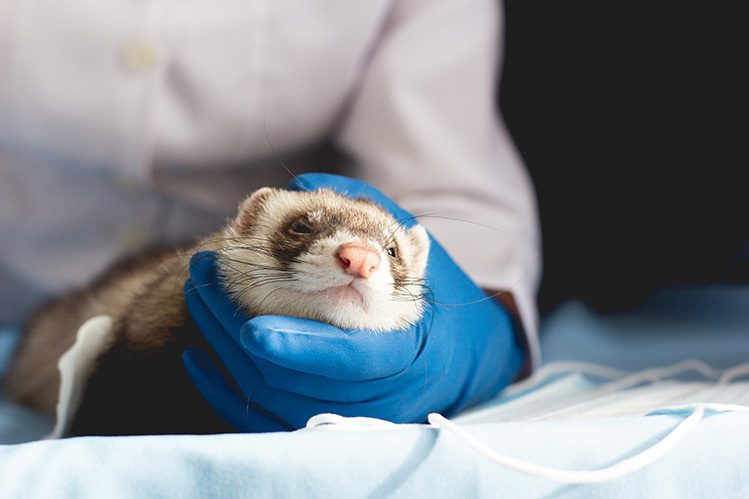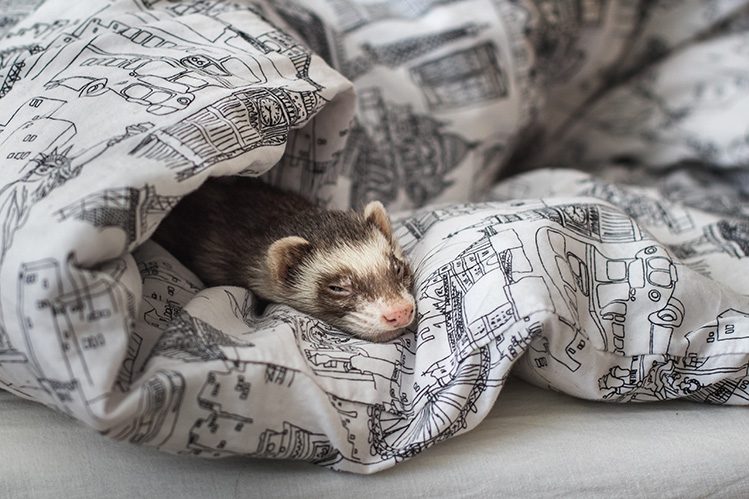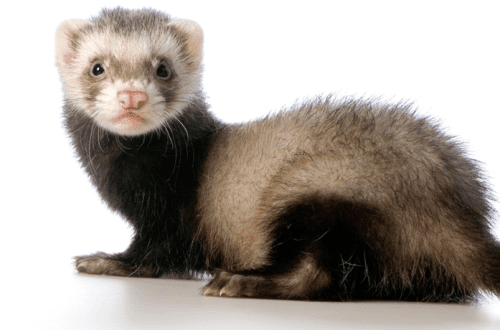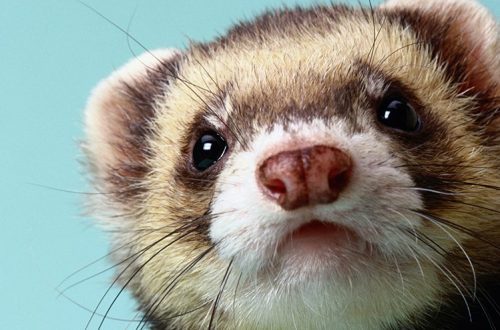
Why does a ferret lose hair?
Ferret owners often ask veterinarians why is my ferret losing hair? Sometimes it only happens in the tail area. But it also happens that after losing hair, the ferret becomes almost completely bald. To understand why this happens, you need to understand the cause of baldness, and, depending on it, take measures. We will talk about the most common causes of hair loss in our article: most likely, your ferret faced this particular problem.
The ferret is an animal not only nimble and inquisitive, but also very clean. He loves taking care of his coat and he’s great at it! However, it happens that the pet’s fur suddenly fades and begins to fall out. Why is this happening? Is this a seasonal molt or a signal of poor health?
First, let’s figure out what a seasonal molt is.
Domestic ferrets, like their wild counterparts, tend to shed. But if domestic dogs and cats can shed almost all year round, then the ferret has a clear seasonal molt: spring (late February – early March) and autumn (October-December) periods. There is no way to avoid this, so the owner should be patient and try to take care of his friend even more carefully.
Do not be afraid if during the seasonal molting the ferret forms hairless areas on the body – this is normal. Ferrets do not shed evenly, but locally. There is nothing dangerous in this, bald patches will soon overgrow.
Ferrets are naturally very clean. They lick their fur all the time, and a certain amount of hairs enters the digestive tract. Accumulated hair in the body can cause blockage of the gastrointestinal tract. Therefore, during the molting period, ferrets need to be helped to get rid of wool. To do this, comb out the pet’s fur coat using the original furminator. This device removes not only the hair that has already fallen out, but dead hairs that are still holding on, but are about to fall out. The more hairs you remove per brush, the less your pet will swallow. Along with regular brushing, treat your ferret with special treats to remove hair.
During seasonal hair loss, there is no need to go to the clinic. But if the shedding is prolonged (lasting more than a month) or the ferret shows signs of illness, this is an occasion to visit your veterinarian.
Seasonal molting is completely normal and natural for a four-legged mischievous. But what if the wool began to fall out sharply at other times of the year or falls out almost constantly?

If your ferret is shedding hair and it’s not seasonal shedding, the best thing to do would be to consult a veterinarian. Preferably immediately with a narrow specialist who works specifically with ferrets. Why is it important?
Symptoms of diseases are often similar: hair loss, for example, can indicate food intolerance, beriberi, or cancer. Only a specialist can make a correct diagnosis and prescribe treatment.
Veterinarians identify several factors that most often lead to hair loss:
malnutrition, lack of vitamins;
elevated temperature and stuffiness in the room where the ferret is kept;
stress and psychological problems;
estrus in females or estrus in males;
pregnancy, childbirth, lactation;
poor hair care;
skin diseases;
otodectosis;
parasite infestation: fleas;
allergy;
autoimmune conditions;
problems with the adrenal glands;
advanced age.
Let’s talk more about some of them.

- Pore clogging.
When a ferret’s tail becomes completely bare, and black or orange dots or scabs are visible on the skin, the pores are most likely clogged. You will have to carry out certain hygiene procedures to clean them.
- Stress.
The mental state of a ferret is no joke. From nervous strain, the animal can become lethargic and weak, lose interest in everything and, of course, get sick.
The task of a responsible owner is to organize a safe comfortable space and leisure for the pet. While awake, the ferret cannot sit still: he needs to explore everything around, climb somewhere, communicate with relatives, other pets and the owner, play and run. Deprive him of all this – you will get an apathetic and unhappy animal with health problems.
Make sure that the ferret has its own secluded place: a box, a box, a house. There the mischievous will be able to hide and be alone with himself. Ideally, if you give the ferret the opportunity to dig something. To do this, you can pour small pebbles into a container with high sides – let it have fun. Don’t forget to play with your furry friend and go outside with him.
- Fleas.
Have you noticed that the ferret often itches and bites the hair? He must have got parasites. In such a situation, it is enough to buy special drops at the withers at the veterinary pharmacy and treat the pet according to the instructions.
- Poor quality food.
For a ferret coat to be strong, soft and shiny, the predator must eat well. The best option is to purchase complete super premium ready-to-eat foods, as their composition is already balanced and you do not have to supplement your pet with anything else.
It is strictly forbidden to give the ferret food from the table: any salty, smoked and other dishes. An unsuitable product can cause an allergic reaction and an imbalance of substances in the body. And hair loss in this case will not be the most serious problem.
- Diseases of the adrenal glands.
This disease is considered the most common in ferrets. The animal begins to peel off the hair from the tail, then from the hips and back. As a result, the cover remains only on the head and limbs. Since the adrenal glands produce too much estrogen, it is painful for the ferret to cope with a small need, the animal can fall into a prolonged estrus or rut, become restless and aggressive.
If all this is observed in your pet, it is important to contact a specialist as soon as possible. In the initial stages, there are great chances for recovery. But if you stretch out the time, the animal may fall into a state of semi-coma or even die.
- Otodectosis.
The cause of otodectosis is an ear mite. It penetrates into the inner surface of the auricle and into the external auditory canal, provoking unbearable itching. The animal begins to comb behind the ears to the bald spots, shake its head, rub it against objects, refuse food. As a result, the hair begins to fall out. If you see black discharge in your pet’s ears, it’s definitely a tick. Treatment should proceed only under the supervision of a veterinarian.
- Avitaminosis.
During it, a violation of phosphorus and calcium metabolism occurs, the animal is deficient in vitamin D. Symptoms of beriberi: diarrhea or constipation, poor appetite, bloating, cessation of growth in young individuals.
- Allergy.
Ferrets, like people, can also have allergies. Someone has an allergic reaction to household chemicals, someone – to bedding material or food, someone – to cosmetics and shampoos. How can you tell if your pet is allergic?
Allergy symptoms:
– redness of the skin,
– quickly
– the presence of scabs and rashes,
– stickiness and moisture on the body,
– combs,
– inflammation and pus on the mucous membranes, lacrimation;
– congestion and swelling of the nasopharynx,
– hard breath.
If you notice these signs, contact a specialist as soon as possible. In severe cases, allergies can lead to choking and are not to be trifled with. It is important to understand that the pet is faced with an allergy, and not with a skin or infectious disease. Their symptoms are similar.
It is important to observe your pet, notice deviations in his behavior and, of course, take care of him. Then your pet will live a long and happy life.





